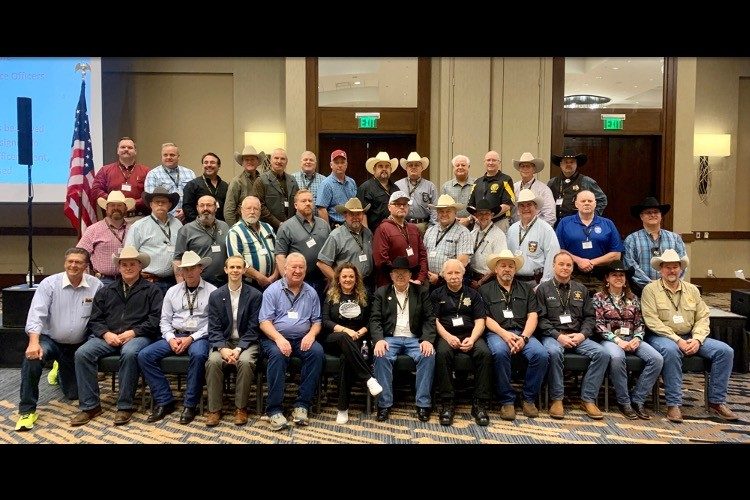
The Constitutional Sheriffs and Peace Officers Association (CSPOA) conducted its most recent training meeting February 26-27 in The Woodlands, Texas. Founded by former Sheriff Richard Mack, CSPOA has been instrumental in supporting U.S. sheriffs in recent months as they resist unconstitutional state and federal mandates.
Via a video message on its website, Mack described CSPOA as a partnership between citizens and local law enforcement, especially sheriffs. He encourages those not in law enforcement to stand with their sheriffs.
“We train sheriffs to defend you, to stand for you, and to stand against tyranny. Have you noticed during this crisis, how many sheriffs have been standing against their governors and mayors? That’s exactly what we train [sheriffs] to do at CSPOA. What we need now is you to be part of this process! Get your sheriffs and deputies to do exactly that. Stand for the constitution, stand for liberty, and keep their oaths of allegiance.”
More and more Americans are learning that the authority and influence of the county sheriff is substantial — law-enforcement powers held by a county sheriff supersede those of any agent, officer, elected official, or employee at any level of government in the sheriff’s county of jurisdiction. The CSPOA website calls the county sheriff “the first line of defense in preserving the Constitutional rights of a citizen. The vertical separation of powers in the Constitution makes it clear that the power of the sheriff even supersedes the powers of the President.”
Noted constitutional authority and attorney KrisAnne Hall spoke to those assembled, tailoring her instruction specifically for sheriffs. Some heard for the first time that the so-called Supremacy Clause of the U.S. Constitution (Article VI, Clause 2) is misinterpreted —state and county laws are superior to federal law, not the other way around, which makes the sheriff the most powerful elected official in the country. Hall also reminded sheriffs, often tasked with civil asset forfeiture, that the practice is nothing more than piracy.
Hall continued, “A sheriff’s job is not law enforcement, but to protect people and their rights — that can include refusing to enforce the law in order to protect them.” Since she was speaking to Texans, she referenced the Texas Constitution regarding the right to keep and bear arms, and a sheriff’s duty to ignore federal gun laws.
“States’ bills of right are usually better than that of the federal government and are better organized. Art. 1, Sec. 23 of the Texas Constitution demonstrates that, stating, ‘Every citizen shall have the right to keep and bear arms in the lawful defense of himself or the State; but the Legislature shall have power, by law, to regulate the wearing of arms, with a view to prevent crime.’” How’s that for individual rights? Not whether you can carry, or what you can carry, or when or where you can carry, only how you can wear it. Texans are expected to be packing!
But being a constitutional sheriff is about more than protecting the Second Amendment; it also included protecting property rights. Hall explained that independence (which Americans claim to value) is dependent on property ownership (meaning complete dominion over what one owns) and property ownership is dependent on liberty. The oath of a sheriff is a vow to protect liberty.
Hall also emphasized the importance of sheriffs building good relationships with the residents of their counties, with other law-enforcement officials, and with the state government. One advantage of good relationships and good communication among the various people at the state and county level is that there is often a better understanding of the constitutional role of the sheriff in law enforcement, and the legal jurisdiction of the various county and state officials.
As an attorney, Hall is teaching sheriffs how to write letters and help craft local ordinances and state- or county-level legislation. When officials understand their constitutional authority and responsibility, much trouble can be avoided down the road. For instance, had Texas sheriffs known how to take a stand on the Mexican border and had been able to mount a unified front backed by county or even state law, maybe Texas Attorney General Ken Paxton would have avoided the lawsuit with the federal government to block the Biden administration’s deportation freeze. Lawsuits are expensive and cost taxpayer money. Likewise, if California sheriffs had had a template to stand up to the California mask mandates, many could theoretically have helped their counties avoid church closures, etc. The idea is to take an early position that could help avoid lawsuits later.
In light of the issues surrounding the 2020 presidential election, sheriffs may be taking on another unexpected task — protection of elections. Noted election-integrity activist Laura Pressley spoke at the training meeting about election fraud, and provided sheriffs with information about their duties to protect voters and poll watchers. A Texan herself, Pressley has been highly successful in challenging election fraud in the state, and training Texans to do their part in protecting vote integrity.
Also in attendance at the conference was CSPOA member and former sheriff Pamela Elliott, who also served as an event speaker. She told The New American, “More sheriffs are attending CSPOA events and other events and are concerned because they realize that the office of sheriff is threatened. They understand they’re facing constitutional issues, and need constitutional answers. You know, sheriffs are constitutionally powerful and protected. Those who see that the position is threatened are turning to CSPOA. More are beginning to understand the duty of interposition.”
Interposition refers to the practice of a lower official placing himself between his constituents and unlawful mandates coming from higher government authorities. For example, many states are codifying their resistance to federal overreach by legislation stating that they will not help the feds violate Americans rights with unconstitutional gun control laws, civil-asset forfeiture, mask mandates, federal control of state land, facial-recognition programs, and so on. County sheriffs are tasked with interposing at the county level.
Attendee Nathan Johnson, sheriff of Real County, Texas, put it this way: “Sheriffs are where the rubber meets the road.” He instinctively knew the state’s mask mandate was wrong, favoring instead the idea of personal responsibility, and decided he would not enforce it. Much more serious issues are at stake, though, and Johnson knows that.
“As sheriffs we need to ask what needs to be done, why it’s urgent, and what can I do? Our forefathers pledged their lives, fortunes, and sacred honor — if I have a criticism of sheriffs, it’s that sometimes they aren’t willing to pledge the next election. We need a mechanism for interposition; knowing how to apply the Constitution is as important as knowing it. We need a mechanism to thwart tyranny. That’s where CSPOA comes in.”
Johnson said he came to understand that there are rational, thoughtful, educated people who fear for their country and want to save it. “Conscientious citizens are trying to understand ‘what can we do.’”
Elliott agrees. She and Johnson were once sheriffs of neighboring counties and became good friends. They both observed that the fight against government overreach is not just a movement among sheriffs, but is very much coming from the citizens of their counties. Elliott noted the critical nature of citizen support. The demand for constitutional sheriffs is as much citizen-driven as it is by the sheriffs themselves.
“I didn’t really get it until my citizens came and said, ‘Step up. They said, ‘You need to stand in front.’ Or, even further, they said ‘Will you stand with me?’ I had to go find an answer then, so I went looking. I really do have the right and duty to say ‘no’. People are thinking in terms of resistance.”
In fact, Sheriff Mack spoke to that in his video message to the conference. “Every citizen should be a member (of CSPOA). What do we get out of this? We restore our liberty! Take back our country one county at a time. You must tell your sheriff ‘We support this idea and we support you and are with you while you stand for American liberty and our God-given rights.’”
Elliott added, “That’s what we’re supposed to do and citizens understand it — it goes beyond Second Amendment issues. I began to understand federal overreach, and other sheriffs are finally understanding because their citizens are telling them, and they have to go find the answers, CSPOA was the answer for me.”
As Johnson stated, “Sheriffs need the tools to properly build local relationships, and find every avenue to solve a problem while continuing to protect citizens’ rights. There might come the Gandalf moment when you say, ‘You shall not pass!’ and we need to be ready for that, but every other avenue has to be exhausted. Yet if tyranny keeps coming, then Gandalf it is.”




